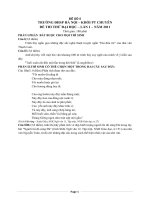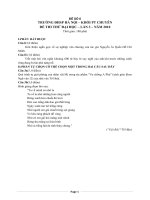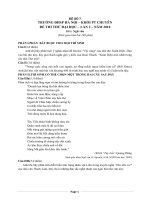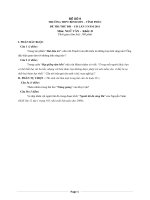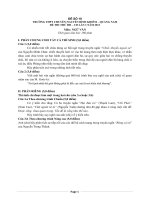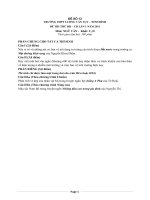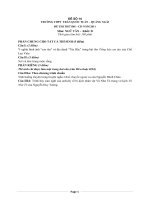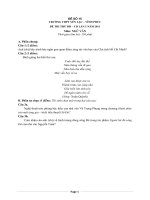đề thi thử tiếng anh đại học các trường THPT chuyên trên toàn quốc đề số (1)
Bạn đang xem bản rút gọn của tài liệu. Xem và tải ngay bản đầy đủ của tài liệu tại đây (263.29 KB, 6 trang )
Page 1
ĐỀ SỐ 4
Đề thi thử đại học lần IV (2013) – Trường chuyên Đại học SPHN
Mã đề số: 441
ĐỀ THI GỒM 80 CÂU (TỪ CÂU HỎI SỐ 1 ĐẾN CÂU HỎI SỐ 80) DÀNH CHO TẤT CẢ CÁC THÍ
SINH
Mark the letter A, B, C, or D on your answer sheet to indicate the word whose stress is placed differently
from that of the others in each of the following questions.
Question 1. A. temperature B. agriculture C. institute D. development
Question 2. A. vulnerable B. politics C. committee D. benefit
Question 3. A. disappear B. volunteer C. picturesque D. compliment
Question 4. A. mankind B. effect C. comment D. control
Question 5. A. demolish B. prohibit C. however D. habitat
Mark the letter A, B, C, or D on your answer sheet to indicate the correct answer to complete each of the
following questions or the answer that is closest in meaning to the underlined part.
Question 6. Educator have made great strides in recent years in combating the ignorance of the nation’s
young about AIDS.
A. unawareness B. fearlessness C. arrogance D. indoctrination
Question 7. – Shall we go out tonight?
+
A. Yes, we go. B. Yes, let’s. C. Yes, I can. D. Yes, we are.
Question 8. I wish I so much homework to do.
A. didn’t have B. hadn’t had C. hadn’t D. would have
Question 9. – Do you want from the supermarket?
A. anything B. something C. nothing D. everything
Question 10. Salt has been used for countries as a method of preserving foods.
A. displaying B. cooking C. conserving D. seasoning
Question 11. I don’t think he’s French. He be Spanish.
A. can’t B. should C. must D. must not
Question 12. Tim has two cars. Of them is new.
A. Neither B. None C. Both D. Each
Question 13. Bob had missed the flight by the time he at the airport.
A. had arrived B. arrived C. was arriving D. arrives
Question 14. Sarah is the prettest girl our school.
A. then B. at C. of D. in
Question 15. Chicken pox result in an eruption on the skin and can leave permanent marks on the skin in
some cases.
A. rash B. hole C. erosion D. division
Question 16. The sun in the west.
A. is setting B. set C. sets D. has set
Question 17. - I help you carry those heavy bags?
A. Will B. Do C. Would D. Shall
Question 18. Ann has never Rome.
A. gone to B. been in C. been to D. gone in
Question 19. You water the plants. I’ve already watered them.
A. can’t B. don’t need C. need not to D. needn’t
Question 20. Film producers now have the ability to reproduce vivid colors as the result of new technology.
A. angry B. drab C. brilliant D. conflicting
Question 21. He had studies hard so he answer all the question in the test.
2
A. is able to B. was able to C. can D. could
Question 22. – Dad, I go to Kelly’s party tomorrow?
A. can B. might C. will D. shall
Question 23. There’s no point her. She never helps anyone.
A. ask B. to ask C. asking D. asked
Question 24. I finished the project but my friends didn’t finish .
A. them B. theirs C. their D. those
Question 25. Only aggressive species of small animal life are likely to survive in the rough waters near
shallow coral reefs.
A. marine B. strong C. a few D. passive
Question 26. She is the swimmer in the team.
A. slowest B. most slowly C. most slow D. slower
Question 27. John down the road when he fell.
A. walked B. was walking C. had walked D. has walked
Question 28. He is lazier than Dave.
A. very B. less C. more D. much
Question 29. The students were made their essays.
A. rewriting B. to rewrite C. rewrite D. to rewriting
Question 30. Hot day it is today!
A. how B. What C. What a D. Such
Question 31. Panama canal divides North and South American.
A. A B. The C. An D. ø
Question 32. Peter, father is a politician, works for The Times.
A. who B. who’s C. which D. whose
Question 33. When he gave up smoking, he put nearly ten kilos.
A. out B. up C. off D. on
Question 34. You’ll never be rich because you .
A. waste money like water C. waste money like liquid
B. spend money like waste D. spend money like water
Question 35. His handwriting is so bad I can’t make what he has written.
A. up B. off C. out D. down
Read the following passage and mark the letter A, B, C, or D on your answer sheet to indicate the correct
answer to each of the question from 36 to 45.
Line It is often the case with folktales that they develop from actual happenings but in their development lose
much of their factual base; the story of Pocahontas quite possibly fits into this category of folktale. This
princess of the Powhatan
5
10
15
tribe was firmly established in the lore of early American and has been made
even more famous by the Disney film based on the folktale that arose from
her life. She was a real-life person, but the actual story of her life most
probably differed considerably from the folktale and the movie based on the
folktale.
Powhatan, the chief of a confederacy of tribes in Virginia, had several
daughters, none of whom was actually named Pocahontas. The nickname
means “playful one”, and several of Powhatan’s daughters were called
Pocahontas. The daughter of Powhatan who became the subject of the
folktale was named Matoaka. What has been verified about Matoaka, or
Pocahontas as she has come to be known, is that she did marry an
Englishman and that she did spend time in Endland before she died there at
a young age. In the spring of 1613, a young Pocahontas was captured by the
English and taken to Jamestown. There she was treated with courtesy as the
daughter of chief Powhatan, while Pocahontas was at Jamestown, English
Page 3
20
25
gentleman John Rolfe fell in love with her and asked her to marry. Both the
governor of the Jamestown colony and Pocahontas’s father Powhatan
approved the marriage as a means of securing peace between Powhatan’s
tribe and the English at Jamestown. In 1616, Pocahontas accompanied her
new husband to England, where she was royally received. Shortly before
her planned return Virginia in 1617, she contracted an illness and died
rather suddenly.
A major part of the folktale of Pocahontas that is unverified concerns her
love for English Captain John Smith in the period of time before her capture
by the British and her rescue of him from almost certain death. Captain
John Smith was indeed at the colony of Jamestown and was acquainted
with Powhatan and his daughters; he even described meeting them in a
1612 journal. However, the story of his rescue by the young maiden did not
appear in his writings until 1624, well after Pocahontas had aroused
widespread interest in England by her marriage to an England gentleman
and her visit to England. It is this discrepancy in dates that has caused some
historians doubt the veracity of the tale. However, other historians do
argue quite persuasively that this incident did truly take place.
Question 36. The main idea of the passage is that .
A. folktales are often not very factual
B. Pocahontas did not really exist
C. any one of Powhatan’s daughters could have been the Pocahontas of legend
D. Pocahontas fell in love with John Smith and saved his life.
Question 37. The expression “arose from” in paragraph 1 is closest in meaning to .
A. developed from B. went up with C. was told during D. climbed to
Question 38. What s true about the name Pocahontas, according to the passage?
A. It was the real name of a girl named Matoaka.
B. It meant that someone was playful
C. Only one girl was known to have used this name.
D. Powhatan was one of several people.
Question 39. How was Pocahontas treated when she was held at Jamestown?
A. with respect B. with disdain C. with surprise D. with harshness
Question 40. It can be inferred from the passage that Pocahontas .
A. never intended to return to Virginia
B. had a long marriage
C. suffered from a long illness
D. did not mean to remain in England
Question 41. The word “indeed” in paragraph 3 is closest in meaning to .
A. therefore B. in fact C. unexpectedly D. in contrast
Question 42. The pronoun “he” in paragraph 3 refers to .
A. The governor B. Pocahontas C. John Smith D. powhatan
Question 43. When did John Smith most likely meet Pocahontas?
A. In 1612 B. In 1613 C. In 1616 D. In 1624
Question 44. Why are some historians doubtful about the portion of the Pocahontas folktale dealing with John
Smith?
A. Captain John Smith probably never Pocahontas.
B. Captain John Smith was never actually in Jamestown.
C. His rescue purportedly happened while Pocahontas was in England.
D. His account of the rescue did not appear until well after the event supposedly happened.
Question 45. The word “veracity” in paragraph 3 is closest in meaning to .
A. timing B. location C. understanding D. accuracy
4
Read the following passage and mark the letter A, B, C, or D on your answer sheet to indicate the correct
word for each of the blanks from 46 to 55.
THE OLD GATE
In the Middle Ages the (46) majority of European cities had walls around them. This was partly for
defensive reasons, but another factor was the need to keep out anyone regarded as undesirable, like people
with contagious diseases. The Old City of London gates were all (47) by the end of the 18
th
century.
The last of London’s gates was removed a century ago, but by a (48) of look, it was never destroyed.
This gate is, in (49) fact, not called a gate at all; its name is Temple Bar, and it marked the (50)
between the Old City of London and Westwinster. In 1878 the Council of London took the Bar down, numbered
the stones and put the gate in (51) because its design was (52) ,it was expensive to (53) and it was
blocking the traffic.
The Temple Bar Trust was set up in the 1970’s with the intention of returning the gate home. The aim of
the Trust is the (54) of the nation’s architectural heritage. Transporting the gate will mean physically
pulling it down, stone by stone, removing and rebuilding it near St Paul’s Cathedral. Most of the façade of the
gate will probably be replaced, though there ia a good (55) that the basic structure will be sound. The
hardest job of all, however, will be to recreate the statues of the monarchs that once stood on top of the gate.
Question 46. A. huge B. vast C. large D. immense
Question 47. A. devoted B. demolished C. declared D. decreased
Question 48. A. stroke B. wave C. hit D. blow
Question 49. A. real B. contemporary C. actual D. current
Question 50. A. borders B. part C. boundary D. line
Question 51. A. storage B. store C. storing D. stock
Question 52. A. unrealistic B. unfashionable C. unavailable D. unbearable
Question 53. A. maintain B. afford C. repair D. fix
Question 54. A. preservation B. reservation C. conservation D. recreation
Question 55. A. capacity B. opportunity C. possibility D. chance
Mark the letter A, B, C, or D on your answer sheet to show the underlined part that needs correction.
Question 56. The issues learned during the early stages of the project causing the researchers to initiate
additional research.
A. during B. stages C. causing D. additional
Question 57. Allen’s not having finished his thesis did not discourage him from applying for other degree
program.
A. Allen’s B. finished C. discourage D. other
Question 58. Only when black bear has been spotted by the forest rangers will this portion of the park be
closed down.
A. when black B. been C. will D. closed
Question 59. That investors in the stock market enjoys increases and suffer declines is simply a fact of the
financial market, and a smart investor is not too excited about the former or crestfallen about the latter.
A. enjoys B. declines C. former D. crestfallen
Question 60. Tests have been performed to determine whether studying TOEFL question will help students
rise their test scores.
A. been B. whether C. studying D. rise
Mark the letter A, B, C, or D on your answer sheet to indicate the best way to complete each of the
following sentences.
Question 61. Better, the team would have been able to defeat the opponent.
A. If it prepares B. If prepares C. Preparing D. Had it prepared
Question 62. The chairman requested that .
A. a committee appointed to study the problem thoroughly
B. a committee be appointed to make thoroughly review of the problem
C. thoroughly review the problem by a committee
Page 5
D. a committee be appointed to review the problem thoroughly
Question 63. Internet companies rely heavily on income from on-line purchases, but .
A. traditional companies as well C. also traditional companies
B. traditional companies too D. so do traditional companies
Question 64. The company had difficult distributing so that they could meet production quotas.
A. sufficiently number of parts in a timely manner to its manufactures
B. a sufficiently number of parts to its manufactures in a timely manner
C. to its manufactures in a timely manner a sufficiently number of parts
D. in a timely manner to its manufactures a sufficiently number of parts
Question 65. and they are separated from one another by vast distances.
A. Being millions of galaxies C. Of the millions of galaxies
B. Are millions of galaxies D. There are millions of galaxies
Read the following passage and mark the letter A, B, C, or D on your answer sheet to indicate the correct
answer to each of the question from 66 to 75.
Line
5
10
15
Cholera, a highly infectious disease, has resulted in millions of deaths time
after time over centuries. It is caused by the bacterium Vibrio cholera, first
isolated by Robert Koch in 1883.
The organism enters the body through the digestive tract when
contaminated food or water is ingested. The bacteria multiply in the digestive
tract and establish infection. As they die, they release a potent toxin that leads
to severe diarrhea and vomiting. This results in extreme dehydration, muscle
cramps, kidney failure, collapse, and sometime death. If the disease is treated
promptly, death is less likely.
In many countries, a common source of the organism is raw or poorly
cooked seafood taken from contaminated waters. The disease is especially
prevalent after a natural disaster or other destruction that results in a lack of
fresh water. Sewer systems fail, and waste travels into rivers or streams; piped
water is not available so people must take their drinking and cooking water
from rive or stream. Because people frequently develop communities along
waterways, the disease can be spread easily from one community downstream,
resulting in serious epidemics.
Question 66. The word infectious in the first sentence is closest in meaning to .
A. communicable B. severe C. isolated D. common
Question 67. According to the passage, cholera is caused by .
A. a virus B. a bacterium C. kidney failure D. dehydration
Question 68. All of the following are probable causes of infection except .
A. eating food cooked with contaminated water
B. eating undercooked seafood
C. eating overcooked pork
D. eating raw oysters
Question 69. What is the logical order of the events leading to the illness?
A. Sanitary system fails, so fresh water is unavailable; disaster occurs; people drink the water; contaminated
water flows into waterways.
B. Disaster occurs; sanitary system fails, so fresh water is unavailable; people drink the water; contaminated
water flows into waterways.
C. Disaster occurs; contaminated water flows into waterways; sanitary system fails, so fresh water is
unavailable; people drink the water.
D. Contaminated water flows into waterways; disaster occurs; sanitary system fails, so fresh water is
unavailable; people drink the water.
Question 70. According to the passage, what is a symptom of the infection?
6
A. Release of a toxin by the bacteria. C. Overeating.
B. Regurgitation. D. Epidemics.
Question 71. Which of the following would be an appropriate title for this passage?
A. Dysentery and Its Effects
B. Water Purification Systems and Their Importance
C. Results of War and Natural Disaster
D. The Causes and Effects of Cholera
Question 72. The word prevalent in the third paragraph is closest in meaning to .
A. dangerous B. commonplace C. unusual D. organized
Question 73. According to the passage, cholera .
A. is easily passed from one person to another
B. is not a real threat
C. is no more dangerous than the common cold
D. cannot be passed from one to another by casual contact
Question 74. What can you infer the passage?
A. Careful cooking and hygiene practices can reduce the chance of getting the disease.
B. Water mixed with other substances will not pass the disease.
C. The respiratory system is the most common area of entrance.
D. Kidney disease is the most common cause of the illness.
Question 75. The word epidemics at the end of the passage is closest in meaning to .
A. studies B. vaccines C. bacteria D. plagues
Mark the letter A, B, C, or D on your answer sheet to indicate the best completion with the words given.
Question 76. careless/ leave/ door/ unlock
A. You are so careless as to leave the door unlock.
B. You are so careless that you leave the door to unlock.
C. You are too careless to leave the door unlocking.
D. You are such a careless person that leaving the door unlock.
Question 77. stand/ no longer/ live/ climate
A. She could no longer stand to live in hot climate.
B. She couldn’t stand living in such hot climate no longer.
C. She could no longer stand living in such hot climate.
D. She could stand but no longer living in that hot climate.
Question 78. man/ painting/ remind/ much/ uncle
A. The man in that painting reminded me very much about my uncle.
B. That painting which has the man in reminds me very much of my uncle.
C. The man in that painting reminds me very much of my uncle.
D. That painting, which contains the man in, make me reminds much for my uncle
Question 79. be/ situation/ action/ take
A. If you’d be in that situation, what action would have been taken by you?
B. Which action you would have taken unless you had been in that situation?
C. Had you were in that situation, which action would you have taken?
D. If you had been in that situation, what action would you have been?
Question 80. illness/ treat/ provide/ catch/ early
A. The illness must be treated providing to catch it early
B. The illness can be treated provided it’s caught early enough.
C. They’ll treat the illness, but one must provide and catch it early.
D. To treat the illness, they provided a way to catch early.
